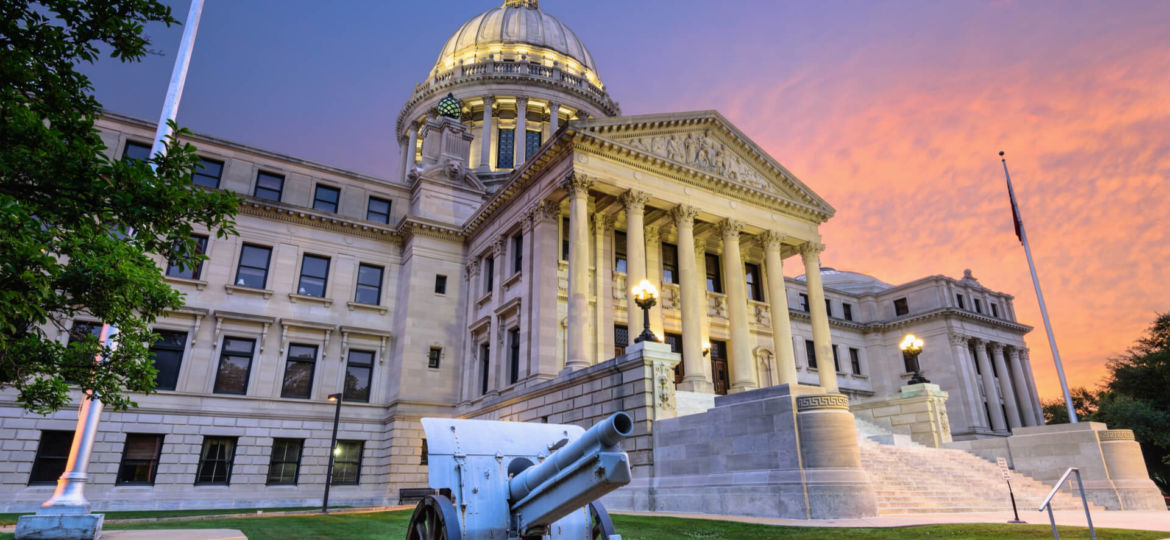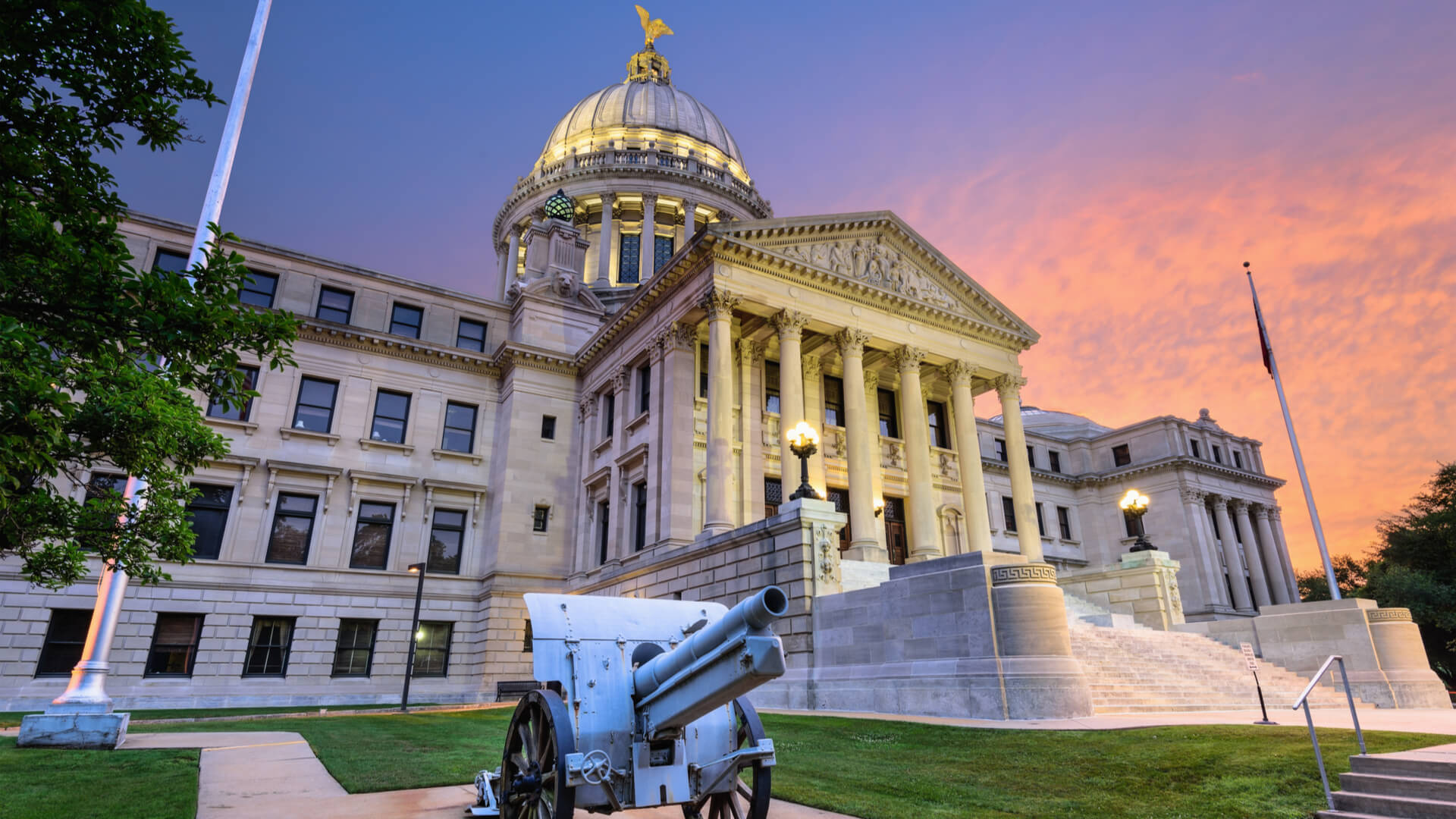
Mississippi is officially the 37th state to legalize medical marijuana. Now, the Mississippi State Department of Health (MSDH) will get to work setting up the new cannabis program.
Governor Tate Reeves begrudgingly signed SB 2095 February 2nd after the state legislature passed the bill with 90% approval. That’s a higher approval count than any other state legislature has ever seen, the Mississippi Medical Marijuana Association says. It follows a 74% vote from Mississippians as a whole.
Continue Reading Below
Individual cities and counties get 90 days to opt-out of allowing medical marijuana facilities for either growing or selling. If that happens, though, the voters within those communities can start up a petition to hold an election that would overrule the decision made by local officials to ban weed.
“This bill is the product of all Mississippians coming together,” said Ken Newburger, Executive Director for the Mississippi Medical Marijuana Association, known as 3MA. “The Legislature has been with us through this entire process to make sure Mississippi patients have a medical marijuana program that is both safe and effective. Mississippi is fortunate to have representatives and senators who respect and honor the will of its voters.”
What Comes Next
There are already companies champing at the bit to get their medical marijuana operations going in Mississippi.
Mockingbird Cannabis is the state’s largest medical marijuana producer so far and its facility is about 70% finished so far. The company’s CEO, a former prosecutor whose daughter suffers from seizures like those medical marijuana patients would aim to treat, says Mockingbird will boost Mississippi’s economy and create new jobs.
Continue Reading Below
Mockingbird has partnered with Nandy’s Candy in the state’s capital to make sure its edible products are produced, stored, and distributed correctly. The shop also plans to have a full beverage line.
The MSDH says it plans to begin accepting applications for cultivation, processing, and testing facilities, along with patients, medical practitioners, cannabis waste disposal entities and cannabis transportation entities by June of 2022. From there, a 30-day approval time follows (or a five-day approval time for patients).


Source: www.mockingbird-cannabis.com
The Mississippi Department of Revenue is handling licensing for dispensaries.
Continue Reading Below
Medical cannabis will be available for patients with debilitating medical conditions like cancer, AIDS, Parkinson’s disease, muscular dystrophy, Crohn’s disease, Alzheimer’s, autism, and sickle cell disease. It can also be prescribed to treat chronic pain, intractable nausea, seizures, and muscle spasms in chronic terminal or debilitating diseases not specified on the State’s exact list.
What the Law Says (And What it Doesn’t)
Governor Tate Reeves has not seemed thrilled about the bill. He threatened to veto it in the past. Then, he fought long and hard to have the language changed to be more restrictive toward what medical marijuana patients have access to.


Source: The White House
“My goal from Day 1 (post Supreme Court ruling) has been to allow for the former and do everything in my power to minimize and mitigate — though knowing it is impossible to eliminate — the likelihood of the latter. After all, the overwhelming majority voted for a medical marijuana program in the 2019 election and I committed to supporting the will of the people,” said the Governor.
Mississippians’ fight for legal medical cannabis took years. In 2020, voters passed Initiative 65 to write a medical marijuana program into the state’s constitution, only to have the Supreme Court throw the measure out in May of 2021, ruling it unconstitutional on a technicality.
Continue Reading Below
The final version of the bill had the following changes, after Governor Reeves demanded they be made before the bill would get his signature:
- The total amount of marijuana a medical patient can receive each month is now just 3 ounces. The bill’s original language pushed for five ounces; Governor Reeves wanted it lowered to 2.5 but settled for the compromise.
- That amounts to 3.5 grams of cannabis per day, six days a week.
- “Said differently, there will be hundreds of millions of fewer joints on the streets because of this improvement,” Governor Reeves wrote about that change in a social media post.
- Doctors can now only prescribe cannabis for treatment of illnesses that fall specifically within the scope of their practice. They must have an established relationship with the patient, so people cannot get medical marijuana cards from doctors they’ve never visited before. The prescription also has to be written following an in-person visit
- Only a medical doctor (MD) or doctor of osteopathic medicine (DO) can prescribe medical marijuana for children under the age of 18, and it can only be prescribed with the consent of the minor’s parent or legal guardian
- Only an MD or DO can prescribe medical marijuana for adults between the age of 18-25.
- Marijuana dispensaries are not allowed within 1,000 feet of a school
“The “medical marijuana bill” has consumed an enormous amount of space on the front pages of the legacy media outlets across Mississippi over the last 3+ years,” said Governor Reeves. “There is no doubt that there are individuals in our state who could do significantly better if they had access to medically prescribed doses of cannabis. There are also those who really want a recreational marijuana program that could lead to more people smoking and less people working, with all of the societal and family ills that that brings.”
Mississippi’s Economy
Mississippi surpassed its revenue estimates by $1 billion in 2021, and is set to do the same in 2022. Still, the State has been pushing for ways to build its economy. Governor Reeves announced the State is investing $25 million in site development projects.
“Here’s another proactive step we’re taking to attract business to Mississippi, grow our state’s economy, & increase wages,” Governor Reeves wrote on Twitter. “Speed to market is key, & we’re doing what it takes to create a business-friendly environment where companies can hire workers & develop products quickly.”
Meanwhile, Mississippi’s new medical marijuana bill specifically outlaws economic development incentives for businesses relating to the cannabis industry. The state often gives financial assistance or tax breaks to help with roads or water access to industrial sites, but cannabis growers and operators will be on their own.
Continue Reading Below
That stipulation could make things tough for the medical marijuana program to get up and moving in Mississippi, as the new law requires all medical cannabis used in Mississippi must be grown and processed within the state.
For the time being, it does not seem Governor Reeves will be considering recreational marijuana as another way to boost the Magnolia State’s economy.


